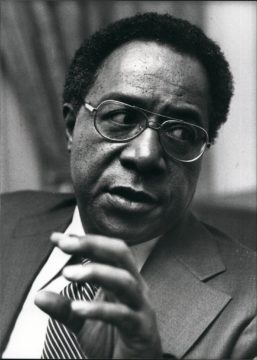Michael Patrick Hearn in The New York Times:
 In 1959, long before his books “The Autobiography of Malcolm X” and “Roots” made him famous, an aspiring writer named Alex Haley, fresh out of the Coast Guard, wrote to six prominent Black writers in Greenwich Village for pointers on how to break into publishing. Only James Baldwin replied, showing up at Haley’s place unannounced one afternoon and chatting with him. Haley was eternally grateful for such generous encouragement from the distinguished author.
In 1959, long before his books “The Autobiography of Malcolm X” and “Roots” made him famous, an aspiring writer named Alex Haley, fresh out of the Coast Guard, wrote to six prominent Black writers in Greenwich Village for pointers on how to break into publishing. Only James Baldwin replied, showing up at Haley’s place unannounced one afternoon and chatting with him. Haley was eternally grateful for such generous encouragement from the distinguished author.
Alex Haley, whose centenary we mark this year, was my James Baldwin. When I entered Hamilton College in the fall of 1968, I was determined to be a writer, so I signed up for Haley’s writing course, not knowing what to expect. I was already familiar with “The Autobiography of Malcolm X,” his collaboration with the Black leader, which had become an instant best seller when it was published three years earlier; my sister had read it at Skidmore College and wrote to me about how powerful it was. (She signed her letter “Cindy X.”) The book blew me away, just as Ralph Ellison’s “Invisible Man” and Eldridge Cleaver’s “Soul on Ice” did later. Attending Haley’s class allowed me to observe him in action for nearly a year while he was working on his magnum opus, “Roots.”
The class was rather free-form — not exactly what Hamilton students were used to. Haley seemed to be making it up as we went along. Stylistically, he was old school, precise and a bit formal. He was always “Mr. Haley” to us; he called me “Hearn.” He enjoyed the conviviality of college life and had enormous faith in young people, but his class was not the place for moody poets or budding novelists. It was a no-nonsense course about the nuts and bolts of being a professional journalist — as Haley was at the time — and he often peppered his lectures with vivid anecdotes from his early days as a writer.
He proudly described how he started out in the Coast Guard during World War II, as the Black Cyrano de Bergerac of the South Pacific, writing letters for his lovesick shipmates to send to their sweethearts. He had dropped out of college to sign up as a mess boy and, after an article he wrote about his experiences aboard ship caught an admiral’s eye, was eventually promoted to the position — created just for him — of chief journalist for the service. He confessed that he was most productive writing at night at sea and often booked passage on freighters to meet deadlines. There were no distractions on a ship, in particular no telephones.
More here.
